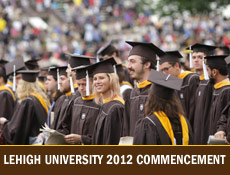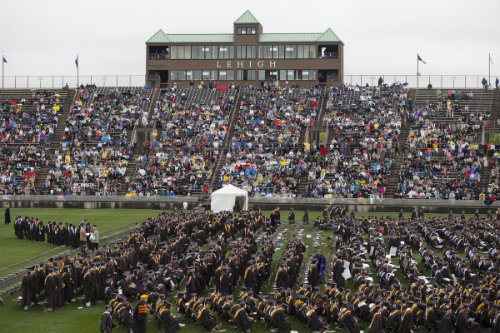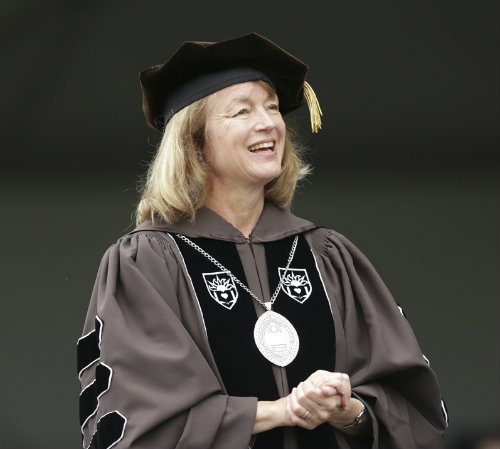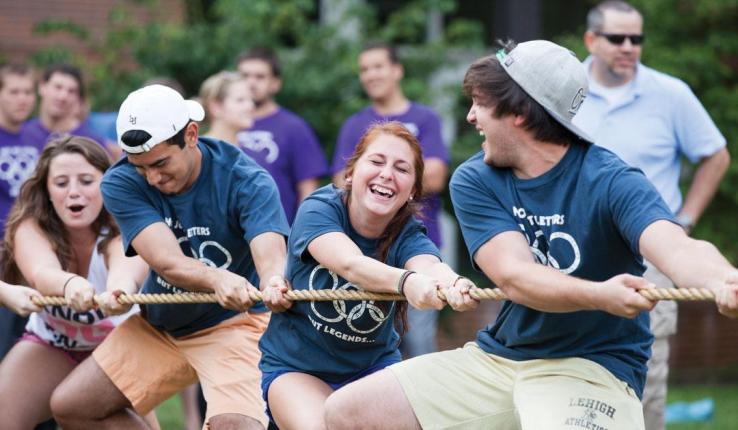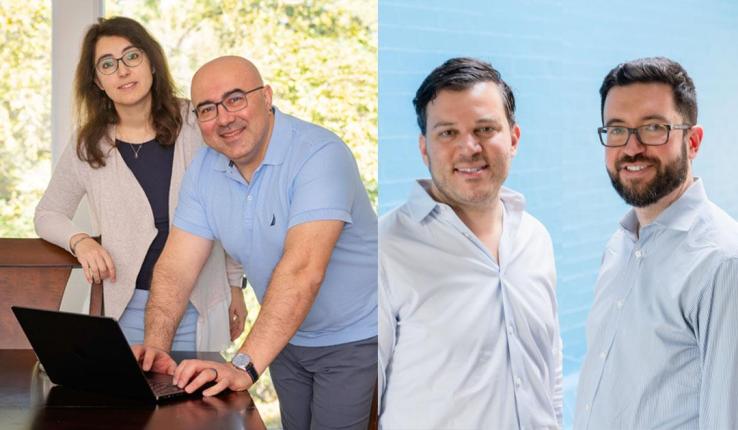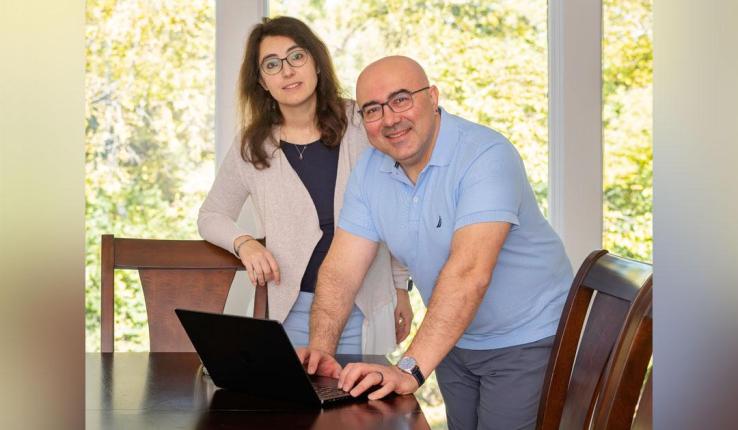Al-Naimi ’62 to Class of 2012: ‘Go make a difference’
Watch the video of Lehigh's 144th commencement ceremony
Ali bin Ibrahim Al-Naimi ’62, the Saudi Arabian Minister of Petroleum and Mineral Resources, returned to Lehigh on the 50th anniversary of his own graduation to challenge the Class of 2012 to “go make a difference” in the world.
“No one can predict the future, but we can all work towards creating the sort of world in which we want our children and grandchildren to grow up,” Al-Naimi said in his address during Lehigh’s 144th commencement exercises Monday at Goodman Stadium. “A world of peace and harmony, of prosperity, of environmental responsibility, of opportunity for all mankind and a world free of hunger and poverty.
“These are lofty ideals but achievable aims. Aims that the class of 2012 should seek to address through their effort, application and determination.”
Al-Naimi, named one of the 100 most influential people in the world by TIME magazine in 2008, rose through the ranks of the Arab-American Oil Co. (Aramco) to become company president and then chief executive officer in the 1980s. After seven years at the helm of the world’s largest oil company, Al-Naimi was appointed Minister of Petroleum and Mineral Resources in 1995. He is now in his fifth term.
President Alice P. Gast noted Al-Naimi’s “leadership of the first coeducational university in Saudi Arabia”—the King Abdullah University of Science and Technology (KAUST). Al-Naimi serves as the first chairman of the KAUST board of trustees.
“Class of 2012, very few people reach the position you have reached here today,” Al-Naimi said. “With that comes wonderful opportunities. But it also brings responsibilities. A responsibility to use your knowledge, as I have tried to do, to bring about progress and positive change.”
Al-Naimi recalled that, when he first arrived in the United States in 1959 from Saudi Arabia, “my country was poor and underdeveloped and the U.S. was already a leading power on the world stage ...
“The relationship and understanding between Saudi Arabia and the U.S. is much improved today,” he said. “Let us not forget that it was U.S. companies which first discovered oil in Saudi Arabia and many thousands of Americans continue to live and work there. When I came here I was one of a very few Saudis who studied in the U.S. Now there are thousands. Our two nations remain allies in the Middle East and have a close relationship when it comes to energy and other matters. For that bond goes far beyond energy.
“We seek together a world of greater understanding, mutual tolerance and respect for human dignity and peaceful interdependence. I hope my visit here today is a further sign of that enduring bond between our two peoples.”
The 40th anniversary of women undergraduates
The commencement ceremony marked the end of a yearlong celebration of the 40th anniversary of women undergraduate students at Lehigh.
Al-Naimi told the students that much has changed at Lehigh in the 50 years since he graduated. “But the greatest improvement has been the introduction of female students to Lehigh 40 years ago,” he said.
Jane P. Jamieson ’75, a member of that first class of 169 female undergraduates who went on to a highly successful career in investment and is now a member of the Lehigh University Board of Trustees, recounted her experiences. Coming from a small, Quaker all-girls high school in Rhode Island to Lehigh, she said, “the contrast could not have been greater.”
“We were ready for a change,” Jamieson said. “The question we had was: Was Lehigh ready for a change? The answer was yes, and no.”
She recalled professors who continued to address their students as “gentlemen,” and recounted how the Marching 97, in the fall of 1971, voted against accepting women. “And there were those in the Lehigh community who simply did not favor coeducation,” Jamieson said. “One of those was Fred—my then-college boyfriend and now husband for the past 35 years. Fortunately, Fred came around and so did the 97.”
Today, Jamieson noted, “women comprise 44 percent of your class.” And she drew enthusiastic applause and cheers when she added: “Only one in four major research universities are led by women, and Lehigh is one of them.”
In her remarks, Gast called on the Class of 2012 to “embrace change,” and drew on Lehigh’s historic decision to accept women as an example of how “meaningful change is hard. In hindsight it may seem simple, but during the process it is hard.
“Look at Lehigh’s decision to become a coeducational institution 42 years ago. What seems like a straightforward decision today, was controversial at the time. Advocates had very strong positions on both sides. In order to effect the change, the men driving it needed to convince those remaining somewhere in the middle. They needed to find the compelling reasons, pragmatic facts to influence opinion. In the end, the decision to go coed at Lehigh happened because it was the right thing to do for Lehigh to survive and to thrive. Lehigh’s core value of excellence combined with pragmatism and foresight prevailed. Today it looks simple.”
While many of the changes in today’s world “are very complex and multifaceted,” Gast said she sees “dangers in oversimplification and extreme stances.”
“You leave Lehigh as educated citizens who can drive the rational and healthy debate about controversial topics,” Gast said. “Use reputable sources and enter into the dialog. Look for the perspectives of others and learn from them. You are on Facebook, Twitter, you write blogs, you have more opportunities than ever before to contribute to dialog, to debate, to confer and to lead change. You have the opportunity and the responsibility to make changes.”
Commencement Notes
A steady rain fell during the procession into the stadium, but it stopped about 20 minutes into the ceremony … a total of 1,887 degrees were conferred at Goodman Stadium: 1,183 bachelor’s degrees; 600 master’s degrees; 99 doctoral degrees; and five education specialist degrees … the Class of 2012 included students from more than 40 countries plus the United States … the ceremony began with a blessing from University Chaplain Lloyd Steffen, and was followed by the national anthem, which was sung by Andrey Stolyarov ’12 … later in the ceremony, Stolyarov led the singing of the alma mater ... Daniel E. Smith, chair of the Board of Trustees, welcomed the assembled audience … Daniel Scansaroli ’05, ’06G, ’09G, a doctoral candidate, delivered the Graduate Student Remarks, and Alexander Gromadzki ’12, president of the Class of 2012, delivered the Senior Class Remarks … toward the end of the ceremony, Gromadzki joined Robert Downing ’62, vice president of the 50-year reunion class, in ringing the bell to welcome the Class of 2012 as Lehigh’s newest alumni … commencement speaker Ali bin Ibrahim Al-Naimi ’62 received an honorary Doctor of Science degree for his advancements in the field of energy … other honorary degree recipients were Jody Williams, who won the Nobel Peace Prize in 1997 for efforts to eliminate landmines, who received the Doctor of Humane Letters, and Lawrence S. Bacow, former president of Tufts University and President-In-Residence at the Harvard Graduate School of Education, who received the Doctor of Pedagogy … Andrew C. Fiala ’92, outgoing president of the Lehigh University Alumni Association, officially closed the ceremony with a welcome to new alumni … the benediction was offered by Margaret F. Plympton, vice president for finance and administration … the Allentown Band, under the direction of conductor Ronald H. Demkee, delivered their 31st consecutive performance at Lehigh’s commencement ceremony. It is America's oldest civilian concert band, with its first documented performance on July 4, 1828.
Photos by Douglas Benedict and Christa Neu
Posted on:


